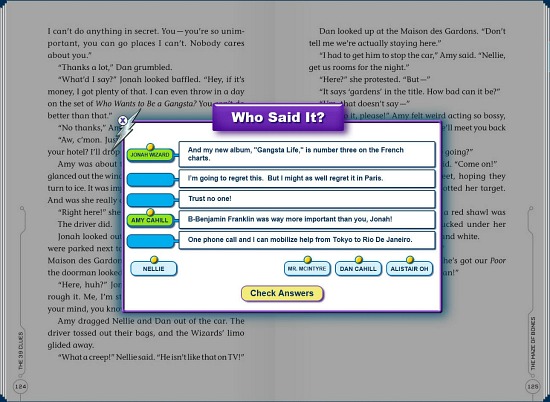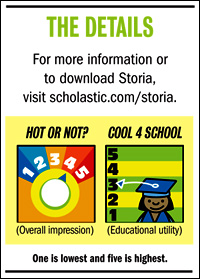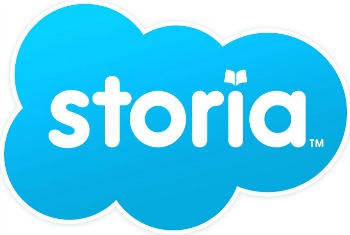
Scholastic has a slick and promising ereader platform called Storia in soft launch and they’re preparing to go big with it this fall. It’s already available for Windows PCs and as an iPad app, and an Android tablet version should be ready by the first bell of the upcoming school year, according to the company. Storia is free to install and comes with five free ebooks. You might want to check it out now so you can talk to parents about it—perhaps at your next Scholastic book fair.
Though Storia could easily evolve into a platform that’s perfect for classrooms and school libraries, right now it’s all about families. Parents can control a dashboard that lets them set up separate, age-appropriate bookshelves for each of their children and stock them with the Scholastic titles they choose  to purchase. Parents can then pop into Storia and monitor their kids’ reading progress, peeking at stats on how long their kids have spent reading, how many pages they’ve turned, and how many new words they’ve learned by looking up definitions in Storia’s excellent illustrated, talking dictionary. Storia also provides young readers with interest/reading level-appropriate suggestions for further reading that kids can add to their wish lists, providing parents with hints on what to buy next in order to keep their children’s reading habits well fed.
to purchase. Parents can then pop into Storia and monitor their kids’ reading progress, peeking at stats on how long their kids have spent reading, how many pages they’ve turned, and how many new words they’ve learned by looking up definitions in Storia’s excellent illustrated, talking dictionary. Storia also provides young readers with interest/reading level-appropriate suggestions for further reading that kids can add to their wish lists, providing parents with hints on what to buy next in order to keep their children’s reading habits well fed.
Scholastic expects 2,500 ebooks to be available by Storia’s official launch in the fall, with thousands more on their way in subsequent school years. Storia ebooks are basically digital replicas of their print counterparts, so illustrations and thoughtful book- design features don’t lose anything in translation. Digital titles are priced similarly to Scholastic’s paperbacks. Storia titles load quickly; look splendid; can be highlighted and annotated; rated and reviewed, and, once downloaded, can be read online or off.
 Among those 2,500 titles available this fall, about 400 of them will be what Scholastic calls “enriched ebooks,” featuring recorded, natural-voice narration—making them perfect for emerging readers and children with reading deficits or visual impairments. Enhanced ebooks also offer tons of opportunities for reading-related interactivity; there are elective word scramble games based on a given title’s vocabulary, for example, and quizzes based on plots and characters. There’s even a drawing tool that invites kids to create their own illustrative interpretations of what they’ve just read. These interactive features are indicated by little lightning bolts beneath the pages, which kids can choose to open or ignore as they read. Parents have a say in that, too: they can opt to turn narration and interactivity off if they feel they’re counterproductive or distracting to the reading experience.
Among those 2,500 titles available this fall, about 400 of them will be what Scholastic calls “enriched ebooks,” featuring recorded, natural-voice narration—making them perfect for emerging readers and children with reading deficits or visual impairments. Enhanced ebooks also offer tons of opportunities for reading-related interactivity; there are elective word scramble games based on a given title’s vocabulary, for example, and quizzes based on plots and characters. There’s even a drawing tool that invites kids to create their own illustrative interpretations of what they’ve just read. These interactive features are indicated by little lightning bolts beneath the pages, which kids can choose to open or ignore as they read. Parents have a say in that, too: they can opt to turn narration and interactivity off if they feel they’re counterproductive or distracting to the reading experience.
Kids will like the way their Storia bookshelf grows and changes with them. For example, older children get more grown-up interface choices, with smaller controls and more sophisticated design and color options. But readers of all ages can easily change their bookshelf’s color scheme and design as often as their shifting tastes dictate.
This excellent ereader platform will help families foster a love of reading in this digital age. I look forward to watching Storia grow and evolve to become as useful and enjoyable in kids’ classrooms as it is bound to be in their bedrooms.
For more information or to download Storia, visit scholastic.com/storia.


